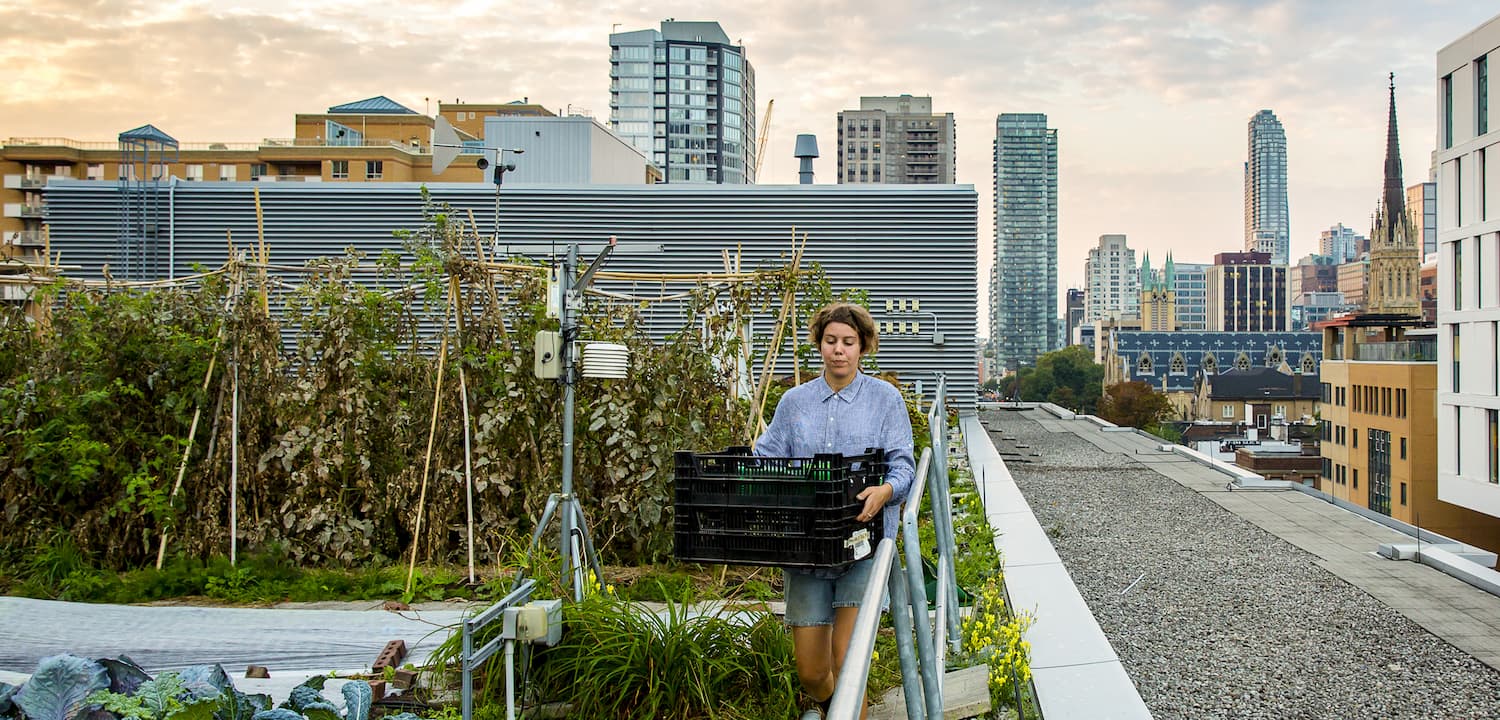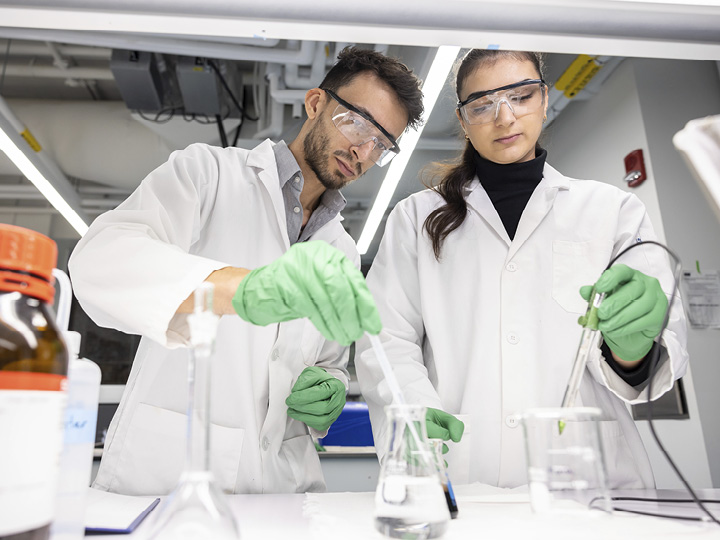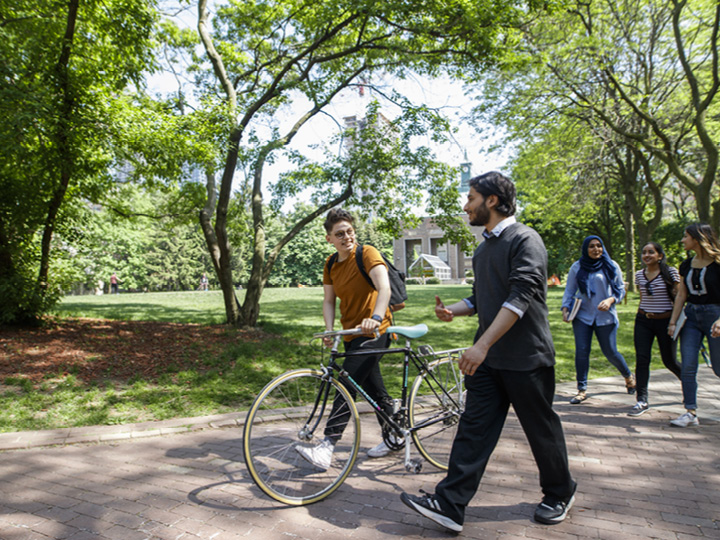SDG 13: Climate Action


SDG 13: Climate Action
TMU tied for 100th place in the world on the 2024 Times Higher Education Impact Rankings for restorative climate action, demonstrating the university’s continued commitment to championing sustainability. Through the Sustainability Office, TMU is doing its part to tackle climate change, reduce campus greenhouse gas emissions, and educate and raise awareness about climate change to empower our campus community to take tangible steps towards a sustainable future.
The university also launched its first Sustainability Action Plan earlier this year, developed in alignment with the Sustainable Development Goals (SDG) and the institution’s sustainable development priorities. The five-year plan will guide our climate-action efforts as we take accountability as an institution and contribute meaningfully towards a greener, more equitable and inclusive future.
In 2023, 50% of the energy used on campus was from low-carbon or no-carbon sources from the Ontario electricity grid, such as nuclear, wind, solar and hydro.
TMU is ranked in the top 100 universities in the world for impact on SDG 13: Climate Action (2024 Times Higher Education Impact Rankings).
Our goals in action

TMU aspires to develop pathways for all students to access sustainability learning and research opportunities that will prepare them to identify, articulate and take action on complex challenges facing our world today. Our faculty members and researchers are teaching and studying sustainability through hundreds of courses, programs and research initiatives, empowering students of any academic background to advance their sustainability knowledge and skills during their time here at the university.
- The Environmental Applied Science and Management MASc and PhD programs at TMU set themselves apart from other programs in that they take a unique interdisciplinary approach to providing students with studies in environmental sciences, technology, and environmental management systems and decision-making.
- In the Environment and Urban Sustainability BA (Hons) program at TMU, students explore how citizens, corporations and governments resist or embrace and enact eco-friendly ideas and approaches. Students learn how to research and resolve environmental issues through fieldwork, consulting for external clients, investigating urban sustainability issues, going on an international exchange and pursuing an optional practicum.
A global cultural shift is imperative to preserve and rehabilitate our fragile ecosystems, maintain our planet's vitality and ensure its inhabitants’ wellbeing. As such, TMU is committed to informing and supporting governments on climate action. As a leading higher-education institution, TMU aims to be a touchstone of innovation and leadership in restorative climate action, social equity and economic stability, with more than 250 faculty members and a number of research centres and institutes studying and innovating to solve climate change and other sustainability issues.
- The Toronto Metropolitan Resilience Engineering Lab (external link) (TMREL) explores human interaction with the environment focusing on the basics: food, water, shelter, health and wellbeing. Recognizing that the global environmental crisis threatens these basics through increasing extreme events worldwide, such as natural disasters and the COVID-19 pandemic, TMREL strives to navigate a path to a more stable relationship between immediate human needs and environmental sustainability.
- TMU Engineering professor Bala Venkatesh and his team have been working in collaboration with Hydro One and Peak Power on a project to develop forecasting and modelling for the planning and operating of power systems that include solar and wind power generators. The project builds on past collaborations with Hydro One on connecting renewable energy to the power grid. While methods on how to anticipate the contributions of individual generators are well established, this project works to develop models and forecasting that considers these renewable energy sources’ contributions in aggregate, addressing a need to anticipate the occasionally uncertain nature of individual renewable energy units, such as a solar panel or wind turbine, while planning for the whole network.
- TMU Real Estate Management professor Anson Ho has researched the effects of natural disaster on consumers’ financial distress, highlighting the need for preparedness for natural disasters, including initiatives from the finance industry and disaster relief from the public sector.
TMU’s Sustainability Office is committed to restorative climate action, and encourages active participation from the entire TMU community to reach our goals of building a more sustainable university and community. Some of the ways the office is helping to drive sustainability forward include offering a series of engaging events and activities to promote sustainable practices across campus.
- TMU’s first Sustainability Action Plan is a five-year plan to guide transformative change and empower our community members to contribute meaningfully towards a greener, more inclusive future. Long-term goals were identified based on their alignment with institutional values, community input, benchmarking opportunities, institutional peers and best practices, government targets and global perspectives.
- TMU is a member of the Green Will Initiative (external link) , a City of Toronto program that seeks to accelerate the reduction of greenhouse gas emissions from buildings in Toronto to support the City’s target of achieving net-zero emissions by 2050 or sooner.

TMU is committed to providing interdisciplinary and experiential learning opportunities that bring students and faculty together to address real-world problems. In this, students will become more fully engaged with communities, service providers and industries as partners in their learning experiences. TMU offers learning opportunities for students to contribute to a more sustainable future through internships, skills-based volunteering, campus clubs and events.
- The Sustainability Ambassador Program and Living Planet @ Campus Program with WWF Canada provide opportunities for potential volunteers who are passionate about sustainability and interested in contributing to a more sustainable campus.
- TMU features university-led and student-led initiatives for students to get involved in sustainability-focused clubs and groups on campus.
- Every year during Orientation Week, the university organizes sustainability-focused events to engage new students on the importance of climate action, to encourage students to participate in sustainable initiatives, and to learn about opportunities to support sustainability on campus.
- The Sustainability Residence Leadership Program empowers students and supports sustainable behaviour across the residence community.
TMU is committed to advancing conversations on culture, economics, technology, social justice and the environment that lead to policies and actions that contribute to building inclusive, resilient, sustainable and dynamic cities. Through knowledge-sharing and collaborations with experts from cities and institutions around the world, we aim to find solutions to critical issues affecting the environment.
- TMU’s The Dais has received funding from Environment and Climate Change Canada to engage 270,000 young Canadians about climate change (external link) on post-secondary campuses and in communities across the country. This project addresses awareness and misinformation surrounding climate challenges and solutions among young Canadians.
- TMU is home to a variety of innovative efforts to address climate change by faculty, students and alumni. Among them, TMU Climate Week, which brings the campus community together to raise awareness about climate action, on and off campus, generate dialogue on potential solutions, and collaborate on strengthening TMU’s position as a leader in sustainability and climate action.
- TMU’s Sustainability Office offers learning opportunities for community members on actions they can take on campus and beyond to contribute to a more sustainable future. The Sustainability Office also provides leadership and professional development opportunities through internships and skills-based volunteering.
- The Tech Harvest (external link) project is a student-run design team at TMU’s Innovation Boost Zone that focuses on building solutions and running activities that create impact in the environmental space, such as affordable composting, urban gardening and community outreach.
Stories
